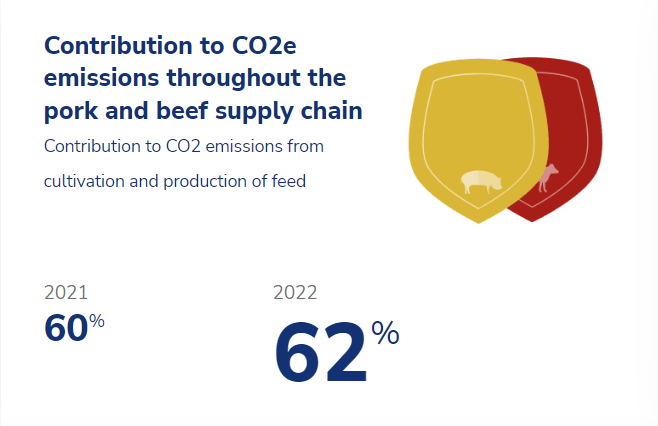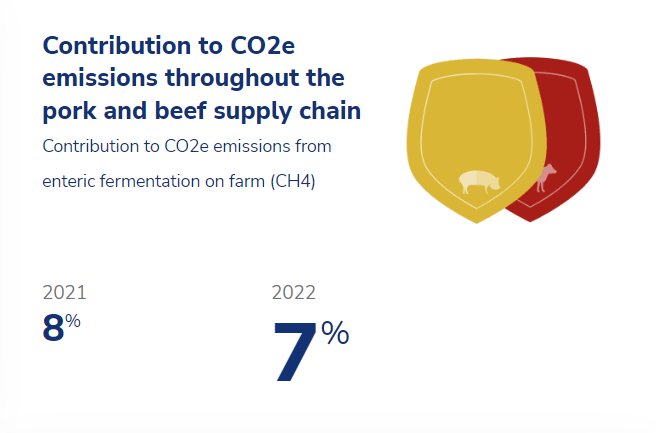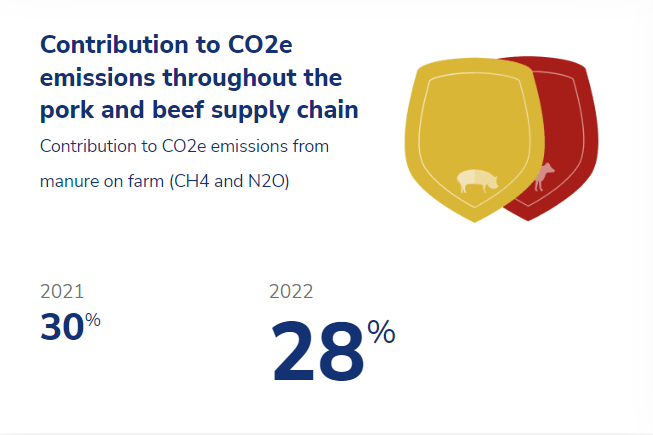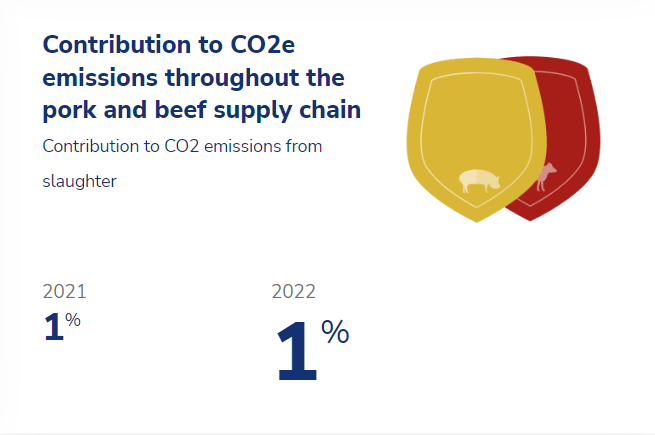The topic ‘Sustainable farming’ is part of our strengthened sustainability strategy, containing topics and targets which are important for sustainable food production and consumption. We intend to bring transparency and sustainability agendas together and thus offer our stakeholders and especially the consumer the possibility of making an informed choice. This means consumers will be able to choose using information not only based on animal welfare, but also on sustainability. We will provide consumers with information on topics such as the carbon footprint on food items like pork, beef, and meat alternatives.
Because of meat’s high nutritional value, within the consumption of food of animal origin, pork and poultry originating from Spain and Brazil is a climate-friendly way to meet consumer’s protein needs. This meat has a similar CO2 footprint to tofu (see figure), although its nutritional value for humans is much higher.
With regard to beef production, methane emissions from rumination and manure cause substantial greenhouse gas emissions. Sedef mainly slaughters dairy cattle and the offspring of dairy cattle which are essentially by-products of dairy production, making the CO2 footprint substantially lower than that of beef from pure meat breeds. In 2021, Sedef calculated the footprint of meat from 10 Dutch dairy farmers. Results show that these Dutch cattle farmers – as with Dutch pig farmers – are in the top 10% of dairy farmers worldwide when it comes to carbon footprint sustainability.
Our commitment is to put onto the market food items with a lower carbon footprint than today’s items and to provide information to customers and consumers on the footprints of the products they buy. To achieve this, we are developing a CO2 label for our products based on the actual data from the supply chain. Our objective is to have the first products with CO2 labels on shelves in 2022.
We expanded the pool of calculated GHG emissions to 100 farms. The objective is to calculate the emissions for all of the approximately 160 Good Farming Star farms.
In general, we advocate the use of soy certified by Round Table Responsible Soy (RTRS). The RTRS certification includes strict requirements on the preservation of natural forests and other natural resources. More specifically, all pigs raised under our Good Farming Star programme are fed with RTRS certified soy. Furthermore, Sedef is working together with dedicated partners to develop the infrastructure that assures the use of soy from fields that were not associated with deforestation (Identity Preserved soy).
Overall, the environmental footprint of pork is lower than that of beef, as ruminants emit more greenhouse gasses, including methane
Within dairy farming, there is growing attention on improving biodiversity. Many Spanish dairy cattle farmers are using the biodiversity monitor – a tool which monitors positive and negative impact on biodiversity. Based on this assessment, a location-specific biodiversity plan has been implemented on farms.
Sedef is committed to a calculation methodology developed by Wageningen University. The practical implementation of food print calculations requires raw data from supply chain partners such as farms and feed suppliers through a robust and reliable data infrastructure. In 2021, we implemented the methodology for pork as an automated calculation system and received data from 45 farms.
All our organic pig farmers with De Groene Weg are EKO-certified and use the EKO-code as a scoring instrument on twelve topics, including energy, soil, manure, biodiversity and circularity. Each supplier is expected to set at least two objectives every year, resulting in a higher score in the next year. This approach ensures the continuous improvement of sustainability in the organic pork supply chain of De Groene Weg.
All our organic pig farmers with De Groene Weg are EKO-certified
Together with industry partners, Sedef discusses possible solutions to a variety of environmental topics. For example, Sedef was a partner in the workgroup initiated by the Dutch government on the reporting of carbon footprints for food in the Netherlands. The output of the workgroup was a project team which will take the lead when it comes to changes in favour of sustainable farming.




Sedef took significant steps to increase the calculation of emissions from farms and to reduce the gap between the number of pig and cattle farmers being assessed. Our focus in 2022 was to achieve transparency, and this effort will continue in the coming years until we have enough data to calculate our CO2 footprint. The use of primary data (the real footprint) showed to be very helpful for farmers to understand the opportunities and challenges that exist to reduce the carbon footprint.
Our target for 2022 was to calculate emissions of 160 pig farms. At publication date we have calculated the results of more than 160 pig farms. Our target for 2023 is to have calculated the results of 250 pig farms.
© 2010 – 2023 Sedef SA. All right reserved.